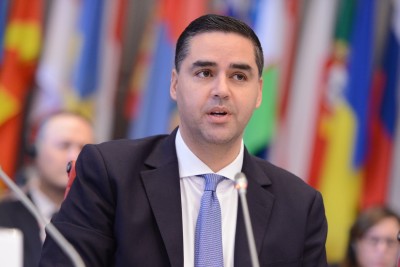Malta Embarks on OSCE Leadership with Security and Resilience at the Forefront
Malta has officially taken the helm of the Organization for Security and Co-operation in Europe (OSCE) for the year 2024, under the leadership of Ian Borg, the Minister for Foreign and European Affairs and Trade. At the inaugural session of the OSCE Permanent Council in Vienna, Borg laid out Malta's ambitious agenda aimed at enhancing security and bolstering resilience across the OSCE's expansive region, amid complex global challenges.
 OSCE Chairperson-in-Office, Minister for Foreign and European Affairs and Trade of Malta, Ian Borg addresses inaugural Permanent Council meeting in Vienna. / Picture: © OSCE/Micky Kroell, ID 561914, (CC BY-ND 4.0)
OSCE Chairperson-in-Office, Minister for Foreign and European Affairs and Trade of Malta, Ian Borg addresses inaugural Permanent Council meeting in Vienna. / Picture: © OSCE/Micky Kroell, ID 561914, (CC BY-ND 4.0)
Borg emphasized Malta's dedication to upholding the foundational principles of the OSCE, rooted in the Helsinki Final Act and the Charter of Paris. These principles, he noted, are not mere options but shared obligations among the 57 participating states, including Malta. At the core of Malta's presidency is a staunch commitment to address the ongoing conflict in Ukraine, with Borg reiterating calls for Russia's immediate withdrawal and the cessation of hostilities.
Malta's vision extends beyond the immediate crises, aiming to foster dialogue and seek sustainable solutions to other conflicts within the OSCE territory, especially in Eastern Europe and the South Caucasus. Borg also pledged to reinforce the operational capabilities of OSCE field missions, ensuring they are well-equipped to support host nations in upholding OSCE principles.
A significant portion of Malta's chairmanship will focus on safeguarding the functionality of the OSCE and enhancing its governance structures. Malta seeks to build upon the successes of North Macedonia's previous chairmanship, prioritizing inclusivity by mainstreaming gender issues and engaging youth in the dialogue process.
The Maltese chairmanship is set to address modern challenges head-on, with initiatives aimed at combating cyber threats, and transnational challenges, and ensuring adherence to arms control commitments. Recognizing the intricate link between security, economic prosperity, and environmental sustainability, Malta plans to advocate for digital inclusion, climate resilience, anti-corruption measures, and food security.
Human rights, fundamental freedoms, democracy, and the rule of law stand as pillars of Malta's OSCE agenda, especially critical in an era marked by significant electoral activities within the European Union and beyond. Borg underscored the importance of media freedom and the protection of journalists, particularly women in the field, from increasing threats and violence.
The Maltese chairmanship coincides with the country's elected membership on the UN Security Council, presenting a unique opportunity to forge synergies between these pivotal international institutions. As Malta steps into this role, it calls for collective efforts from all participating states to navigate the complex landscape of global security with a shared commitment to peace, security, and prosperity.
As Malta embarks on this journey, it has received support from international partners, including Austria. Austrian Foreign Minister Alexander Schallenberg, during a meeting with Borg, expressed Austria's full backing for Malta's OSCE chairmanship, highlighting the critical role of dialogue in addressing the myriad of security challenges facing Europe and its neighboring regions. The two ministers also discussed migration pressures in the Mediterranean, underscoring the importance of collaboration in managing this enduring challenge.
Malta's OSCE chairmanship is poised to navigate a critical juncture in international affairs, emphasizing dialogue, inclusivity, and resilience as key to fostering a secure and peaceful future.



